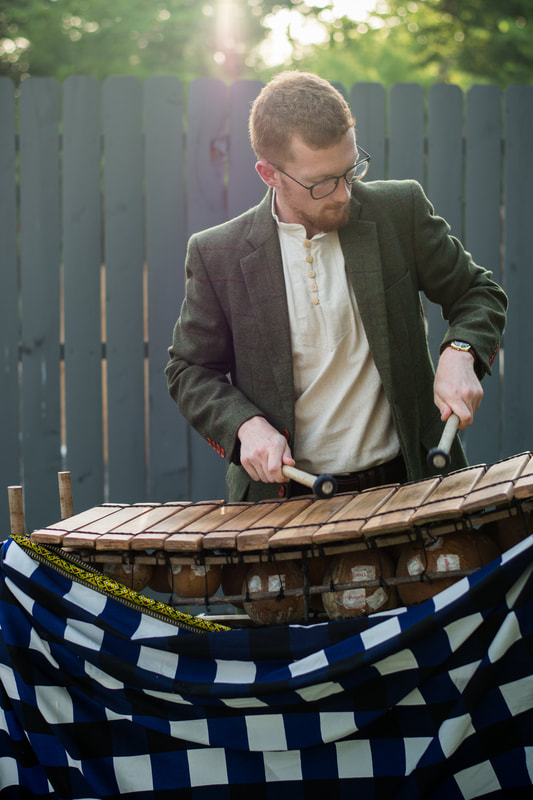BIOGRAPHY
Lawson Malnory is a musician, ethnomusicologist, arts manager, singer-songwriter, recording artist, filmmaker, and percussionist trained in orchestral, popular, and world musics.
His diverse performances range from a weekend of concerts with the Lawton Philharmonic (Oklahoma) to a rindik duet accompanying a jogeg dance in Ubud (Bali). Lawson learned from members of the Dallas Symphony Orchestra, The Dallas Opera Orchestra, and the world music ensemble D'Drum. He spent several years as the drummer for Dallas band Love Junky, performing frequently in historic Deep Ellum and contributing to the soundtrack of Night Hawks, the short film by Carlos Garcia, Jr. Lawson has also published three records of his original songs: The Front of the Line (2020), Two Thousand & One (2021), and Here & Everywhere (2022).
Lawson graduated from Southern Methodist University, with a Bachelor of Music degree in Percussion Performance and a minor in Arts Management, and Arizona State University, where he earned an MA in Ethnomusicology. His experience as an arts administrator includes work with Voices of Change, where he is currently a member of the Board of Directors; Helping Hand Drums, a 501(c)3 which he co-founded and continues to manage; Bridge the Gap Chamber Players, the Fine Arts Chamber Players, the Dallas Symphony Orchestra, and The Phoenix Symphony, where he is currently the Orchestra Personnel Manager.
Lawson has studied ethnomusicology in the classroom at SMU and Arizona State University and on location in Bali and Cuba. He writes, films, hosts, and edits a documentary series on YouTube called Music that Moves, which examines the relationship between place and musical experience on a global scale. He is also a member of the Advisory Committee at the Cuyamungue Institute, the organization with which he conducted his MA research.
Lawson's taste in music is eclectic and his influences are equally diverse, allowing for a unique ability to conceive of music through a variety of distinct perspectives. He applies this plurality of vision to his work as a creator, researcher, educator, and administrator. His favorite musical quote when he wrote this was "wosiye ngoma" - Shona for you're leaving the music.*
*Quoted from Simon Mashoko's performance of "Mbiriviri" on The Soul of Mbira: Traditions of the Shona People of [Zimbabwe] (1973)
His diverse performances range from a weekend of concerts with the Lawton Philharmonic (Oklahoma) to a rindik duet accompanying a jogeg dance in Ubud (Bali). Lawson learned from members of the Dallas Symphony Orchestra, The Dallas Opera Orchestra, and the world music ensemble D'Drum. He spent several years as the drummer for Dallas band Love Junky, performing frequently in historic Deep Ellum and contributing to the soundtrack of Night Hawks, the short film by Carlos Garcia, Jr. Lawson has also published three records of his original songs: The Front of the Line (2020), Two Thousand & One (2021), and Here & Everywhere (2022).
Lawson graduated from Southern Methodist University, with a Bachelor of Music degree in Percussion Performance and a minor in Arts Management, and Arizona State University, where he earned an MA in Ethnomusicology. His experience as an arts administrator includes work with Voices of Change, where he is currently a member of the Board of Directors; Helping Hand Drums, a 501(c)3 which he co-founded and continues to manage; Bridge the Gap Chamber Players, the Fine Arts Chamber Players, the Dallas Symphony Orchestra, and The Phoenix Symphony, where he is currently the Orchestra Personnel Manager.
Lawson has studied ethnomusicology in the classroom at SMU and Arizona State University and on location in Bali and Cuba. He writes, films, hosts, and edits a documentary series on YouTube called Music that Moves, which examines the relationship between place and musical experience on a global scale. He is also a member of the Advisory Committee at the Cuyamungue Institute, the organization with which he conducted his MA research.
Lawson's taste in music is eclectic and his influences are equally diverse, allowing for a unique ability to conceive of music through a variety of distinct perspectives. He applies this plurality of vision to his work as a creator, researcher, educator, and administrator. His favorite musical quote when he wrote this was "wosiye ngoma" - Shona for you're leaving the music.*
*Quoted from Simon Mashoko's performance of "Mbiriviri" on The Soul of Mbira: Traditions of the Shona People of [Zimbabwe] (1973)
